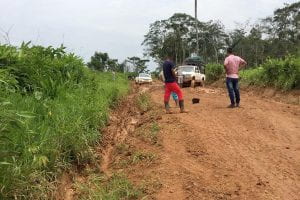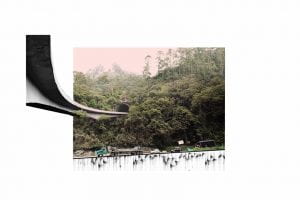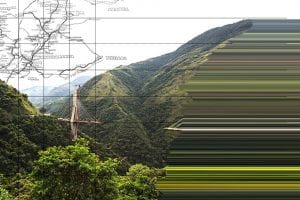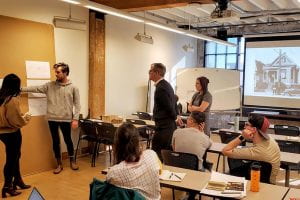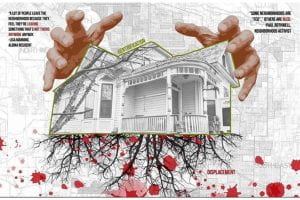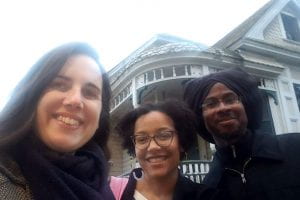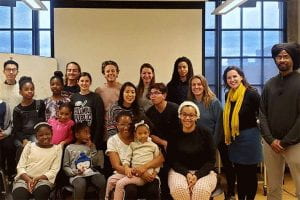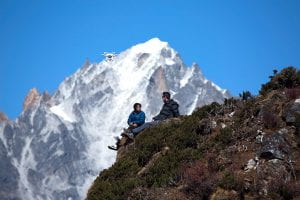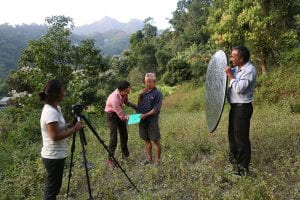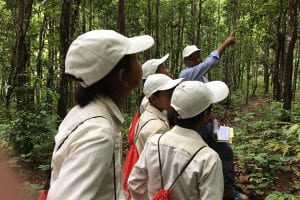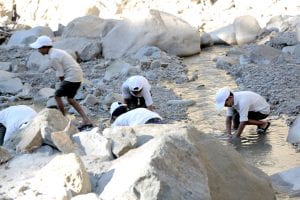Season 1 Podcasts
Hosted by Priyanka Bista, Design for Spatial Justice Fellow, SAE, University of Oregon
Edited by Mary Anne Funk, School of Journalism and Communication, University of Oregon
Music by DJ Amadeusz from Chicoco Radio all the way from the waterfronts of Portharcourt, Nigeria
Podcast recording studio and equipment provided by the School of Journalism and Community, University of Oregon
Episode 01: Menna Agha
Theorizing architecture from the point of view of the other
Read the Episode 01 Transcript
Menna Agha is a researcher and architect. Spatial justice an overarching theme in Agha’s work but it was not a choice born of luxury. She is a third-generation Nubian woman whose family was displaced by the Egyptian state as part of the Aswan High Dam project in the 1960s. As an educator and a designer, she firmly believes that issues relating to spatial justice should be prominent in architecture studios, not just in academic settings.
She concluded her PhD in architecture at the University of Antwerp (Belgium) in 2019, and she holds a Master’s degree in Integrated Design with a focus on Gender and Design from Cologne Technical University (Germany) 2011. And a BSc in Architecture Engineering from University in Cairo, Egypt in 2009.
The main focus of her research lies in the intersection of spatial production and social justice, especially the spatial issues and gendered relations within the context of displacement. Throughout her research, Agha investigates concepts of public space, the emotional in the built environment, and territoriality of the landless. She focuses on the idea of “Active Marginality”, and is occupied with questions such as; how to build for, from, like, and within the “margin”?
Her research on Nubian displacement has been published in several publications, as she authored an article on spatial products of shadow economies titled “The Non-work of The Unimportant” which was a part of a special issue on alternative economies in Kohl journal of Body and Gender Research (Beirut, Lebanon). She also co-authored “Liminal Publics, Marginal Resistance: Learning from Nubian Spaces” which was published at the IDEA journal for Interior Design/ Interior Architecture. In addition to several forthcoming articles on displacement, emotional placemaking, and architecture practice.
During her career, Agha was awarded the civil society scholar award by the open society foundations. She was also awarded her doctoral scholarship by the University of Antwerp. Nevertheless, she takes great pride in several recognitions by her village’s organization for her academic achievements over the years.
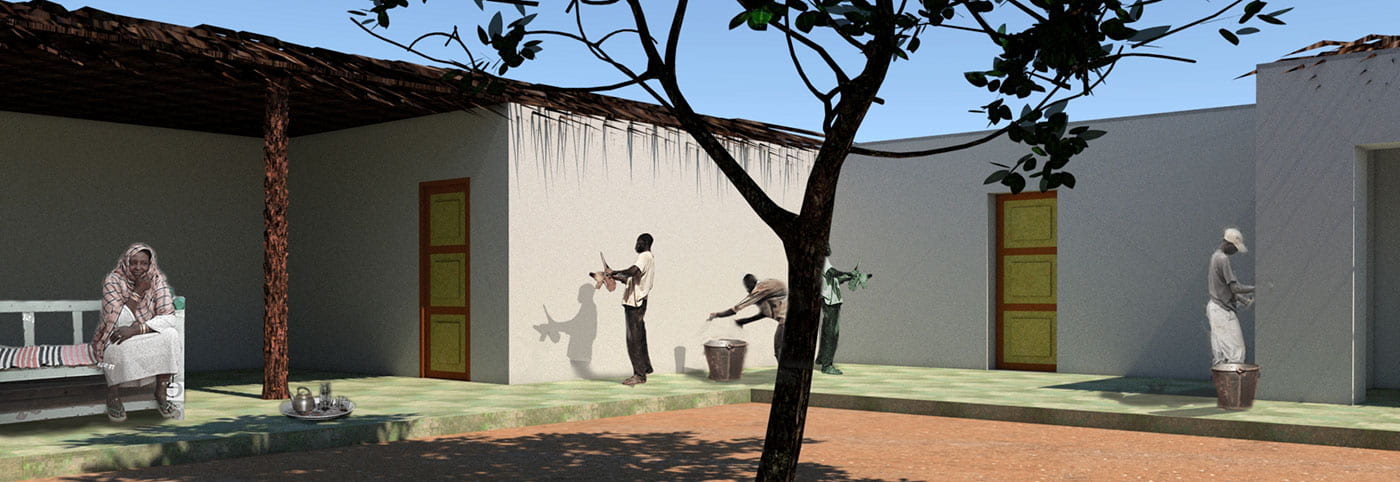
Episode 02: Zannah Mae Matson
Reading uneven power structures and racial hierarchies through infrastructure
Read the Episode 02 Transcript
Zannah Mae Matson’s research and design work focus on the histories and contemporary reinterpretations of landscapes throughout processes of colonization, violence, and state infrastructure projects. Her current project focuses on a highway development project in Colombia’s eastern piedmont region in an investigation that brings together questions of landscape visuality, infrastructural promise, state-sponsored colonization, haunting violence, and extractivist economic motivations.
Across her research, Matson aims to bring the critical scholarly tradition of human geography together with the deeply spatial approach of design research in order to address the ongoing operation of coloniality, violence, and racial discrimination. Matson is a PhD Candidate in Human Geography at the University of Toronto and holds a Masters of Landscape Architecture from the Harvard Graduate School of Design. Guided by critical geographic theory, she brings together these disciplinary approaches to emphasize the power of visual and spatial production as a practice that can fundamentally challenge narratives of landscape modernity and developmental progress. She has published her work in The Funambulist, Site Magazine, and Society & Space Online, among others, and has exhibited her creative outputs in numerous venues.
In professional practice, Matson has worked with Public Work, MassLBP, and OPSYS Landscape Infrastructure Lab, where she was the Project Manager and Exhibition Designer for the Canada Pavilion at the Venice 2016 Biennale Architettura. The exhibition, titled EXTRACTION, has been written about in The Walrus, The Globe and Mail, Border Lines, and Azure Magazine and won the Azure Magazine 2017 Award for Social Good because of the project’s commitment to revealing the social and ecological impacts of resource extraction on Indigenous territory.
As an educator, Matson is deeply committed to critical pedagogy that emphasizes accessibility and creating spaces for learning and unlearning. She has developed her approach to teaching as a studio instructor at the Ryerson School of Urban and Regional Planning, co-teaching a design-intensive course at the Guangzhou Academy of Fine Arts, and as a course instructor at the University of Toronto’s Department of Geography and Planning.
Episode 03: Karen Kubey, Cleo Davis, and Kayin Talton Davis
Rebuilding Cornerstones: Spatial Justice for Portland’s Black Diaspora
Read the Episode 03 Transcript
Portland’s history (and present) is riddled with stories of housing discrimination. However, when we discuss the systemic practice of redlining or the history of clearing out predominantly Black neighborhoods to make way for things like the I-5 Freeway, Memorial Coliseum, and Emanuel Hospital, it’s often through the broad narratives and statistics. As a result, many of the individual stories, along with histories of Black culture and prosperity in Portland, get lost.
Longtime residents and artists Cleo Davis and Kayin Talton Davis hope not just to put a face on one of those stories, but to create a space where others can do the same. In partnership with the City of Portland Archives and Portland State University, they are converting the Mayo House, an Albina-neighborhood Victorian home that they saved from demolition, into the ARTchive, an art hub, studio, archive, and intergenerational community space for the Black diaspora in Portland.
In collaboration with Karen Kubey, they have developed a master’s-level architectural design studio called “Rebuilding Cornerstones: Spatial Justice for Portland’s Black Diaspora.” Through design proposals combining architecture and historic preservation, grounded in community histories and policy research, this studio and the Davis’ ongoing work seek to contribute to spatial justice for Portland’s Black diaspora. Students produced designs bringing together the ARTchive with new residential and commercial development, and co-designed with local youths a corner plaza for the Historic Black Williams Project. This podcast episode tells the story of Karen, Cleo, and Kayin’s work inside and outside of the studio to help build a more just Portland.
About Karen Kubey
Karen Kubey is an urbanist specializing in housing and health and a Fellow in Design for Spatial Justice at the University of Oregon. She is the editor of Housing as Intervention: Architecture towards Social Equity (Architectural Design, 2018) and served as the first executive director of the Institute for Public Architecture. Kubey co-founded the New York chapter of Architecture for Humanity (now Open Architecture/New York) and co-founded and led the New Housing New York design competition. Holding degrees in architecture from the University of California, Berkeley and the Columbia University Graduate School for Architecture, Preservation, and Planning (GSAPP), Kubey began her career as a designer of below-market housing. She has received support from the New York State Council on the Arts and The MacDowell Colony.
She is currently working toward the publication of Good Neighbors II, a book that updates and expands the 1997 comprehensive guide to affordable housing design in the US.
About Cleo Davis
Cleo Davis started his education in architecture at the University of Oregon further changing to industrial design at San Jose State. He is an artist whose work takes a critical view of the social, political and cultural issues and through his work, he continues to reconstruct the cultural view modernizing while also highlighting traditions. Although he engages with multiple subjects and mediums his methodology remains consistent. He also has started the screw loose Studio the Mayo House project and most recently, the archives project in collaboration with Kayin.
About Kayin Talton Davis
Kayin started off in an artistic direction from a very young age, but later learned her love for math and science and pursued a Bachelor’s in mechanical engineering at Portland State University. Her design projects were always influenced by a drive to be accessible to all. She started the soapbox theory in 2001, as a way to express herself creatively. And through these mediums, her interest is always in creating something that is positive, helpful and accessible to all but especially children from culturally underrepresented communities.
Contact:
Cleo Davis: cleodavis@hotmail.com
Kayin Talton Davis: kayin@soapboxtheory.com
Karen Kubey: kkubey@uoregon.edu
Links:
reBuilding Cornerstones website
reBuilding Cornerstones Instagram
Housing as Intervention: Architecture towards Social Equity, Architectural Design (AD)/Wiley, 2018
Root Shocked Documentary, Cecilia Brown, 2019
Episode 04: Priyanka Bista and Rajeev K Goyal
An insight into the designing and building of the “Vertical University” project in Eastern Nepal
Read the Episode 04 Transcript
We’ve entered the Anthropocene, an era that is witnessing the greatest biodiversity loss since the Dinosaurs era some 65 million years ago. In this context, the way in which we design needs to incorporate not only the requirements of human species but also non-human species. The Vertical University project emerged in Nepal, in response to this biodiversity extinction threat to protect and safeguard biodiversity found across the vertical gradient of Nepal from the lowest elevation, Koshi Tappu to Mount Kanchenjunga, 8586 m.
Priyanka Bista and Rajeev Goyal are co-founders of the Vertical University project. In this podcast, they will elaborate on how the project was conceived and developed over the last five year period.
About Priyanka Bista
Priyanka Bista is a Nepali-Canadian architect, and designer working at the intersection of public interest design and biodiversity conservation. She’s the Co-Founder and Design Director of KTK-BELT studio, a non-profit based in New York that works collaboratively with local communities to create the “Vertical University” project in Eastern Nepal spanning an 8,000-meter vertical gradient from Koshi-Tappu Wildlife Reserve (67 m.) to Mount Kanchenjunga (8,586 m.), the third tallest peak in the world.
She has previously held the position of Senior Architect and Planner at Collaborative Media Advocacy Platform (CMAP), Nigeria, where she worked on the “Human City Project” employing participatory mapping, planning and design techniques in informal settlements of Port Harcourt. Over the last six years, she has been working closely with marginalized youth from urban informal settlements to rural villages to build their technical and design capacity to contribute towards inclusive and sustainable development of their communities.
Her work has won numerous awards including the What Design Can Do Climate Action Challenge, the Energy Globe Award, the SEED Public Interest Design Award, UIAA Mountain Protection Award, and Holcim Award for Sustainable Construction. She has degrees in Architecture, International Architectural Development and Regeneration and Shelter after Disaster from Ryerson University, Toronto and Oxford Brookes University.
About Rajeev Kumar Goyal
Rajeev Goyal, a native of Long Island, NY is a lawyer, author, conservationist, and a development worker. A Peace Corps volunteer in Nepal from 2001 to 2003, Rajeev was the national director of PushforPeaceCorps.org, a grassroots advocacy campaign that increased the Peace Corps budget by $60 million in 2010, paving the way for more than 1,000 new volunteer positions globally.
He is a graduate of Brown University, the New York University School of Law and a Masters in Agriculture at Cornell University. He is the recipient of the Franklin H. Williams Prize, the America-Nepal Friendship Society Award, and the Eric Dean Bender Prize. Most recently he was named an “Asia 21 Leader” by the Asia Society. His first book, “The Springs of Namje” (Beacon Press, 2012) won the Paul Cowan Non-Fiction Award. Rajeev lives between Nepal and Singapore with his partner and writes about plants and people across Asia.
Contact:
Links:
